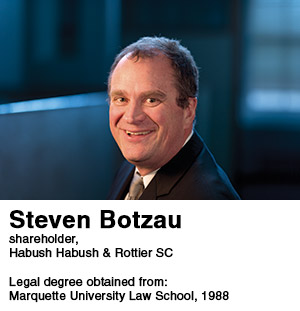 Steven Botzau planned to be a teacher, until a dispute with a college landlord gave him a taste for the courtroom.
Steven Botzau planned to be a teacher, until a dispute with a college landlord gave him a taste for the courtroom.
“[My college roommates and I] brought a lawsuit to get out of the lease and get the property condemned,” the Habush Habush & Rottier SC shareholder said. “They hired a lawyer. I represented myself and my roommates, and we had a trial. I won, and I told my roommates, ‘You know, this law thing doesn’t seem so bad.’”
Though he abandoned his plans to become a teacher, the instinct never really left him, which might explain his approach to mentoring new associates, such as Benjamin Wagner, now a partner at the firm.
When Wagner joined the firm in 2003, right after law school, Botzau let him handle cases on his own, including cases that Wagner didn’t have a great shot at winning.
“Steve struck such a great balance in allowing me to succeed and fail on my own,” Wagner said. “He helped me learn to try cases, manage client relationships and, of course, how to win, but also how to learn when you lose.”
Botzau said he feels privileged to be able to give back, whether that’s through mentoring at the firm or volunteering in the community.
He’s a former president of the Racine County Bar Association, which in 2009 named him Volunteer of the Year. He was recognized, in particular, for his efforts to coordinate training for bailiffs statewide, as well as his participation in mock trials as part of Law Day observances with Racine Public Schools.
Botzau also has coached youth sports, serves on the board of directors for Racine Youth Sports and, since 2010, has organized the Gus Macker basketball tournament, which brings together hundreds of athletes each year to raise money for RYS.
“I’m a guy who has a lot of lists,” Botzau said. “I carry them with me and try to get to as many [items] as I can.”
Juggling family, community and church involvement has been the biggest challenge of his career, he said.
His ability to do so is one of the things Wagner said he admires most.
“He’s able to do all these things (within the firm) and still be a father and, now, grandfather, and he also is a community leader,” Wagner said. “He is a true mentor.”
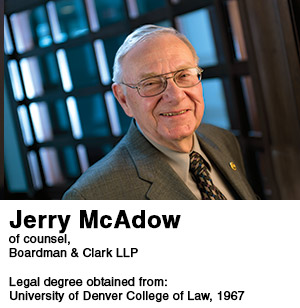 Jerry McAdow intends to wind down his career.
Jerry McAdow intends to wind down his career.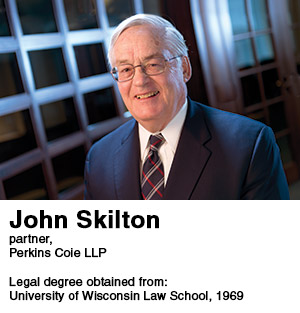 John Skilton witnessed change firsthand while in college and law school during the 1960s.
John Skilton witnessed change firsthand while in college and law school during the 1960s.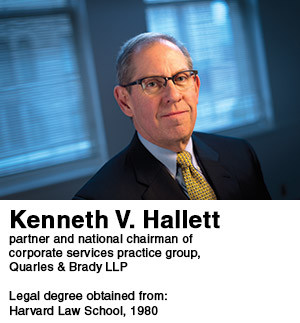 Mentoring isn’t just what Kenneth V. Hallett does, it’s who he is.
Mentoring isn’t just what Kenneth V. Hallett does, it’s who he is.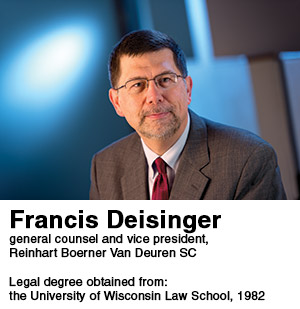 Clients turn to attorneys when they have problems or questions, but what about when it’s the attorney with the problem?
Clients turn to attorneys when they have problems or questions, but what about when it’s the attorney with the problem?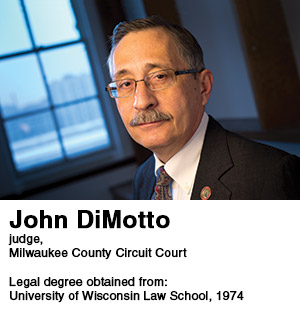 When most law students graduate, they put their case-briefing days behind them.
When most law students graduate, they put their case-briefing days behind them.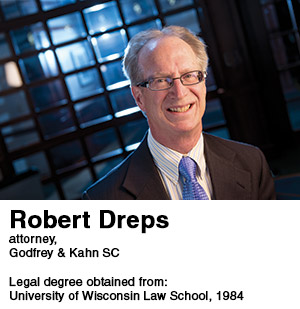 While most people haven’t heard of Robert Dreps, they have benefited from his work, said April Rockstead Barker of Schott, Bublitz & Engel SC, Brookfield.
While most people haven’t heard of Robert Dreps, they have benefited from his work, said April Rockstead Barker of Schott, Bublitz & Engel SC, Brookfield.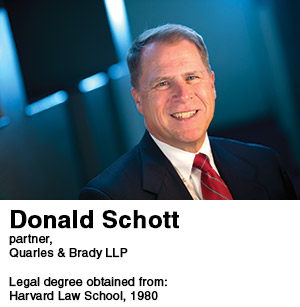 Donald Schott is a problem solver both for his clients and his firm.
Donald Schott is a problem solver both for his clients and his firm.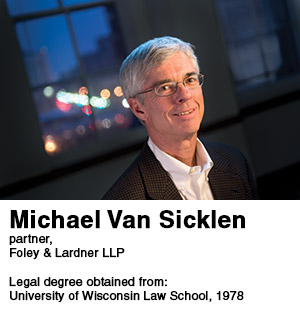 Long-running litigation cases can be an occupational hazard for attorneys, with lawsuits going on for years.
Long-running litigation cases can be an occupational hazard for attorneys, with lawsuits going on for years. Ralph Weber’s career includes standout verdicts and educational reform.
Ralph Weber’s career includes standout verdicts and educational reform. Ross Anderson won his first case when he was in the sixth grade.
Ross Anderson won his first case when he was in the sixth grade. An interest in architecture and history drew Bruce Block to the law, but it’s his ability to broker public and private sector deals that has kept him in practice for nearly 35 years.
An interest in architecture and history drew Bruce Block to the law, but it’s his ability to broker public and private sector deals that has kept him in practice for nearly 35 years.